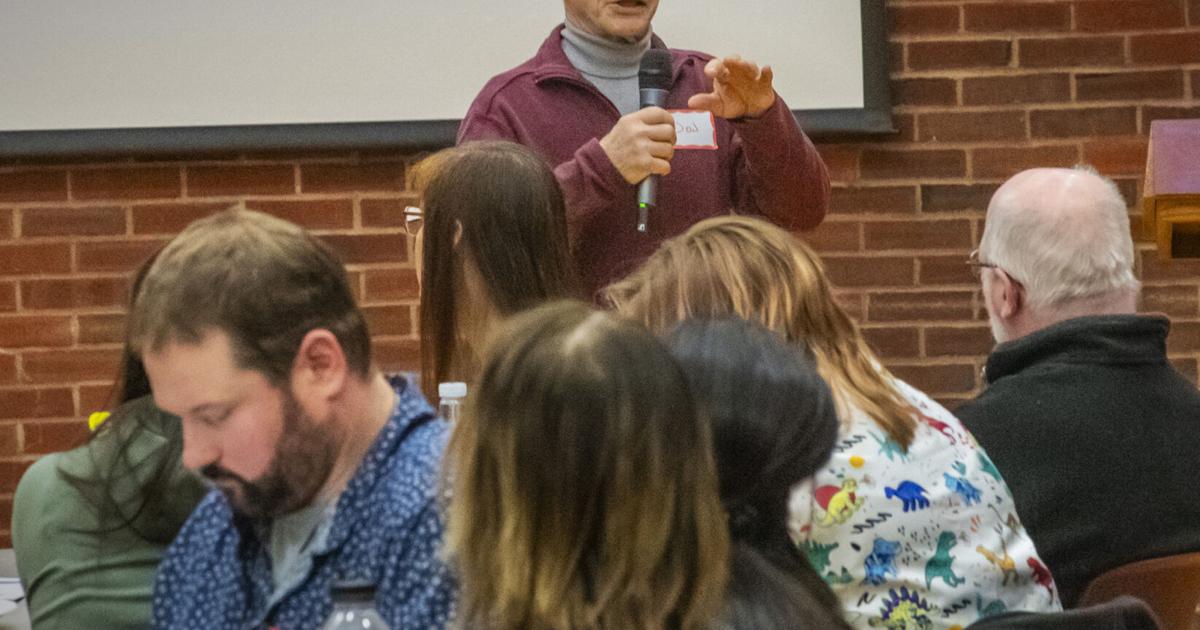POTSDAM — On Friday, more than 80 educators, parents and others got together at SUNY Potsdam’s Knowles Hall to share experience, insight and knowledge about the life of students with autism. Hosted and organized by the Founder and Director of the Institute for Learning Centered Education, Don E. Mesibov, the forum was focused on simple, common-sense ways to make life in the classroom better for students and teachers. “This is not a typical conference—not a series of presentations,” Mesibov said. Participants were split into small groups, given tasks, and asked for their opinions and observations throughout the day. Because of poor interactions with autistic students, Mesibov said that classroom lessons are disrupted, administrators’ time is wasted, and children with autism suffer severe trauma, often due to misunderstandings that could be avoided with a bit of information. Sometimes, simple interactions can escalate quickly when people misunderstand the world someone with autism lives in. A well-intended pat on the back by a teacher or bus driver can cause a panic attack for some students with autism, Mesibov said in material distributed at the forum. A child with autism may need to look away from the person speaking to focus on understanding what is being said. A quiet sound can be deafening to some people with autism. Conner M.W. Newcomb, a 24-year-old man with autism, said he hopes to foster respect. “I want to help people learn about and understand autism,” he said. “We are all different, and we want to be respected.” Recently, Newcomb started writing poetry to cope with the challenges he faces. The free verse poems are reflections of what it is to have autism, he said. “They are also about nature and cats and what’s important to me,” Newcomb said. Newcomb said he has aspirations of becoming a teaching assistant to prevent the repetition of his bad school experiences. “It would have been better if there had been a person who understood what I was about,” he said. Kathy Wilcox, a senior vocational rehabilitation counselor for the state education department’s Access VR program, was one of several presenters who talked about services available to students and others. Students generally start working with her when they reach the end of high school and prepare for life beyond school structures. She said she was there to connect with educators and show how her program could benefit youth on the autism spectrum to foster the independence they will need when they leave school. She said the conversations she had in her group at the forum were eye-opening. “For some people, there have been ‘Aha’ moments,” she said. In addition to autism, Wilcox said, many of her clients have other issues. “At least 90% of the students I work with have ADHD, mental health problems, anxiety, depression, OCD,” she said. Angela M. Rust, a high school English teacher from Clifton-Fine Central School, said she was there with several other Clifton-Fine educators searching for information. She said it was one particular student she was interested in but was sure other students would benefit from what she could learn. “I worry we are not meeting his needs,” she said. “We need to learn about resources.” In Mesibov’s opening remarks, he said that autism is a crisis. “If you doubt my use of the word crisis, talk to parents of children with autism. As I become known for being a pest with my focus on autism, I hear from a growing number of people throughout the country who have children with autism. I have rarely spoken with the parent or grandparent of a child with autism who hasn’t told me of enormous difficulties they have had with their local schools, including schools that many consider to be among the best, and probably are,” he said. “And this is almost always because of misunderstandings by otherwise competent and caring educators or support staff who have little information to guide them.” The Institute for Learning Centered Education’s Autism Initiative offers extensive information and training for educators, parents, business owners and anyone interested. They offer free two-hour sessions (virtual or in person) for schools, organizations, or workplaces. More information is available at learningcentered.org. I Would Play With the Tag On My Clothes When I was young, I would play with the tag on my clothes, Because of how it felt. Some tags were strong and rough on me. Best were tags that could be bent, Strong paper for skin sensitivity, It was soothing to me. Think of it as a pacifier. Feeling of the tags in my hand Pulls me to thoughts as a kid. Sensitive skin sensations would calm me. Connor M.W. Newcomb
This content was originally published here.
